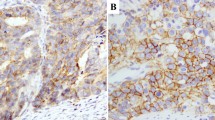Abstract
This study aimed to detect the relationship between CD40 (protein and mRNA) expression and human gastric cancer and to determine the prognostic significance of CD40 in gastric cancer patients. We collected 128 cases of gastric cancer specimens, and the expression of CD40 (protein and mRNA) was measured by immunohistochemistry and in situ hybridization. Our study indicated that CD40 is constitutively expressed in human gastric carcinoma tissues. Positive expression of CD40 (protein and mRNA) in gastric cancer tissues was closely related to the tumor TNM stage and the presence of distant metastasis, with CD40 mRNA also being correlated with the presence of lymphatic metastasis. Furthermore, the expression of CD40 (protein and mRNA) is closely related to the prognosis of gastric cancer patients. The expression of CD40 protein and mRNA is positively correlated with the presence of distant (for both protein and mRNA) and lymphatic (for mRNA only) metastasis, and an increased tumor TNM stage in gastric carcinoma. Patients who express low levels of CD40 may have a better prognosis than those who have higher levels of CD40.




Similar content being viewed by others
References
Hohenberger P, Gretschel S. Gastric cancer. Lancet. 2003;362:305–15.
Ferlay J, Shin HR, Bray F, Forman D, Mathers C, Parkin DM. Estimates of worldwide burden of cancer in 2008: GLOBOCAN. Int J Cancer. 2008;127:2893–917.
Jemal A, Bray F, Center MM, Ferlay J, Ward E, Forman D. Global cancer statistics. CA Cancer J Clin. 2011;61:69–90.
Vestal RE, Wingett LK, Kinght LK, et al. Expression of CD40 in breast, colon, lung and ovarian tumors. Proc Am Assoc Cancer Res. 1997;38:A1550–6.
Van Kooten C, Bancherean J. Functions of CD40 on B cells, dendritic cells and other cells. Curr Opin Immunol. 1997;9:330–41.
Alexandroff AB, Jackson AM, Paterson T, et al. Role for CD40–CD40 ligand interactions in the immune response to solid tumours. Mol Immunol. 2000;37:515–26.
Li R, Chen W-C, Wang W-P, Tian W-Y, Zhang X-G. CD40 signaling activated by agonistic anti-CD40 monoclonal antibody 5C11 has different effects on biological behavior of gastric carcinoma cells. Immunol Lett. 2010;. doi:10.1016/j.imlet.2010.02.007.
Luqman M, Klabunde S, Lin K, et al. The antileukemia activity of a human anti-CD40 antagonist antibody, HCDl22, on human chronic lymphocytic leukemia cells. Blood. 2008;. doi:10.1182/blood-2007-04-084756.
Oflazoglu E, Stone IJ, Brown L, et al. Macrophages and Fc-receptor interactions contribute to the antitumour activities of the anti-CD40 antibody SGN-40. Br J Cancer. 2009;. doi:10.1038/sj.bjc.6604812.
Furman RR, Forero-Torres A, Shustov A, et al. A phase I study of dacetuzumab(SGN-40, a humanized anti-CIM0 monoclonal antibody)in patients with chronic lymphocytic leukemia. Leuk Lymphoma. 2010;. doi:10.3109/10428190903440946.
Lo SS, Wu CW, Chi CW, Li AF, Chen JH, Lui WY. High CD40 expression in gastric cancer associated with expanding type histology and liver metastasis. Hepatogastroenterology. 2005;52(66):1902–4.
Li R, Chen WC, Pang XQ, Tian WY, Wang WP. Zhang XG.CD40 signal expression in gastric cancer tissue and its correlation with prognosis of gastric cancer patients. Mol Biol Rep. 2012;. doi:10.1007/s11033-012-1734-5.
Bosman F, Cameiro F, Hmban R, editors. WHO classification of tumours of the digestive system. Lyon: iarc Press; 2010.
Leslie HS, Mary KG, Christian W, editors. TNM classification of malignant tumors. 7th ed. New York: John Wiley & Sons Inc; 2009.
Zhang BH, Liu W, Li L, Lu JG, Sun YN, Jin DJ, Xu XY. KAI1/CD82 and MRP1/CD9 serve as markers of infiltration, metastasis, and prognosis in laryngeal squamous cell carcinomas. Asian Pac J Cancer Prev. 2013;14(6):3521–6.
Weiss LM, Chen YY. EBER in situ hybridization for Epstein–Barr virus. Methods Mol Biol. 2013;. doi:10.1007/978-1-62703-357-2_16.
Yamaguchi H, Tanka F, Sadanaga N, et al. Stimulation of CD40 inhibits Fas-or chemotherapy-mediated apoptosis and increases cell motility in human gastric carcinoma cells. Int J Oncol. 2003;23:1697–702.
Deregibus MC, Buttiglieri S, Russo S, Bussolati B, Camussi G. CD40-dependent activation of phosphatidylinositol 3-kinase/Akt pathway mediates endothelial cell survival and in vitro angiogenesis. J Biol Chem. 2003;278:18008–14.
Shafee N, Kaluz S, Ru N, Stanbridge EJ. PI3K/Akt activity has variable cell-specific effects on expression of HIF target genes, CA9 and VEGF, in human cancer cell lines. Cancer Lett. 2009;. doi:10.1016/j.canlet.2009.03.004.
Brian G, Werneburg G, Stephen J, et al. Molecular charaterization of CD40 signaling intermediates. J Biol Chem. 2001;46:43334–42.
Ottaiano A, Pisano C, De Chiara A, et al. CD40 activation as potential tool in malignant neoplasms. Tumori. 2002;88:361–6.
Eliopoulos AG, Young LS. The role of the CD40 pathway in the pathogenesis and treatment of cancer. Curr Opin Pharmacol. 2004;4(4):360–7.
Lee HH, Dadgostart H, Cheng Q, Shu J, Cheng G. NK-jB-mediated up-regulation of Bcl-x and Bfl-1/A1 is required for CD40 survival signalling in B lymphocytes. Proc Natl Acad Sci USA. 1999;96:9136–41.
Hennino A, Berard M, Krammer PH, Defrance T. FLICE-inhibitory protein is a key regulator of germinal center B cell apoptosis. J Exp Med. 2001;193:447–58.
Luo LL, Zhang Y, Hou CM, Qiao CX, Li Y. Research advances of anti-CD40 monoclonal antibody. Zhongguo Shi Yan Xue Ye Xue Za Zhi. 2013;. doi:10.7534/j.issn.1009-2137.2013.02.053.
Byrd JC, Kipps TJ, Flinn IW, et al. Phase I study of the anti-CD40 humanized monoclonal antibody lucatumumab(HCDl22)in relapsed chronic lymphocytic leukemia. Leuk Lymphoma. 2012;. doi:10.3109/10428194.2012.681655.
Vonderheide RH, Flaheny KT, Khalil M, et al. Clinical activity and immune modulation in cancer patients treated with CP·870,893, a novel CD40 agonist monoclonal antibody. J Clin Oncol. 2007;25(7):876–83.
Acknowledgments
This research was supported by Natural Science Foundation of Shandong Province (No. Y2007C025).
Conflict of interest
The authors report no conflicts of interest in this work.
Author information
Authors and Affiliations
Corresponding author
Rights and permissions
About this article
Cite this article
Guo, J., Xiao, JJ., Zhang, X. et al. CD40 expression and its prognostic significance in human gastric carcinoma. Med Oncol 32, 63 (2015). https://doi.org/10.1007/s12032-014-0463-0
Received:
Accepted:
Published:
DOI: https://doi.org/10.1007/s12032-014-0463-0




